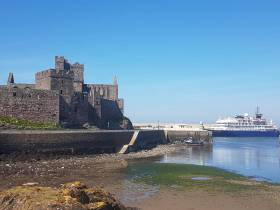Displaying items by tag: Inagural Cruise Trio
A trio of cruiseships recently visited the Isle of Man and notably all of the vessels were making an inaugural call to the Irish Sea island.
According to CruiseEurope the visiting cruise callers were welcomed by Cruise Isle of Man in what they are calling a Week of Maidens, which began on May 22.
Rob Callister MHK, political member with responsibility for Visit Isle of Man and motorsport, commented: “Receiving three inaugural calls [Hapag-Lloyd’s Hanseatic Nature (see also Dublin) Overseas Adventure Travel’s Corinthian and Vantage Cruises’ Variety Voyager] in one week is extremely rare and a fantastic result for our cruise consultants, Neptumar. It is wonderful to see a range of regular and new cruiselines visiting the island and taking advantage of all we have to offer.
“The work the team has been doing in promoting not only the Isle of Man but also our Manx produce is extremely beneficial to the Island’s economy as we continue to increase the value of cruise visitors. The recent Cruise Welcome Scheme has been well received with fifteen businesses on board in just three weeks, promoting incentives and offers to cruise passengers.
‘We are delighted to see cruiseships visiting the ports of Douglas, Peel and Port Erin in 2019 and welcome the benefits this brings to all areas of the Island as we look to diversify the number of sites visited by cruise passengers and crew.”
Vantage Cruises first contacted the Isle of Man cruise team in 2018 and have booked 10 calls for Variety Voyager during 2019 and have already booked their new ship, Ocean Explorer, for three calls in 2021.
Passengers will enjoy guided tours, bespoke and artisan activities, heritage sites and world-renowned vintage transport, with the Corinthian using Isle of Man Railways’ Dining Car on all 10 of her visits this year.





























































